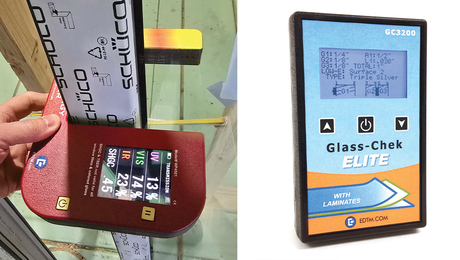*
I have a 1960 ranch house with a crack in the shower pan. The shower is tile. The pan appears to be the same cement type material used in school floors. The crack does not appear to be leaking. The sub floof does not show any water stains. What can be done short of ripping out the tile and replacing the pan? Thank you.
Discussion Forum
Discussion Forum
Up Next
Video Shorts
Featured Story

New devices showcased at the Builders' Show make it easy to measure glass performance, u-factor, SHGC, window thickness, and more.
Highlights
Fine Homebuilding Magazine
- Home Group
- Antique Trader
- Arts & Crafts Homes
- Bank Note Reporter
- Cabin Life
- Cuisine at Home
- Fine Gardening
- Fine Woodworking
- Green Building Advisor
- Garden Gate
- Horticulture
- Keep Craft Alive
- Log Home Living
- Military Trader/Vehicles
- Numismatic News
- Numismaster
- Old Cars Weekly
- Old House Journal
- Period Homes
- Popular Woodworking
- Script
- ShopNotes
- Sports Collectors Digest
- Threads
- Timber Home Living
- Traditional Building
- Woodsmith
- World Coin News
- Writer's Digest


















Replies
*
Dennis,
Your crack is most likely in the cement bed that was put down over a vinyl or possibly sheet lead pan. If you do not have a leak then the pan is doing what it is designed to do. There are all kinds of cracks. The fix may be as simple as a little grout or as extensive as breaking out and puting in a new bed and tiles. This is standard repair work. Need to identify the cause of the crack. Most likely normal frame and floor joist settling. Unless, of course, you are on a slab.
*I think what Dennis means when he says his pan looks like "school floors" is that his pan is made of terrazzo, a mixture of epoxy or colored cement and marble chips. If so, he can repair the crack with a flexible caulking or fill with a two part epoxy. Dennis, what does the joint between the pan and tile look like? If no cracks, then the pan is probably not flexing (yes, terrazzo pans do flex). If that is the case, and you have not been able to find any signs of water leakage, the pan probably has just a surface crack. After repeated hot/cold cycles times time, there will be some crazing evident, especially in the resin formulas used back then. However, over time--can't say how long--the crack will propagate other, more serious cracks. This may not concern you for some years. To get back to your original question: I suggest lightly abrading the surface of the pan and then applying a coat of clear epoxy to the entire pan. Don't mix it too "hot".
*
I have a 1960 ranch house with a crack in the shower pan. The shower is tile. The pan appears to be the same cement type material used in school floors. The crack does not appear to be leaking. The sub floof does not show any water stains. What can be done short of ripping out the tile and replacing the pan? Thank you.